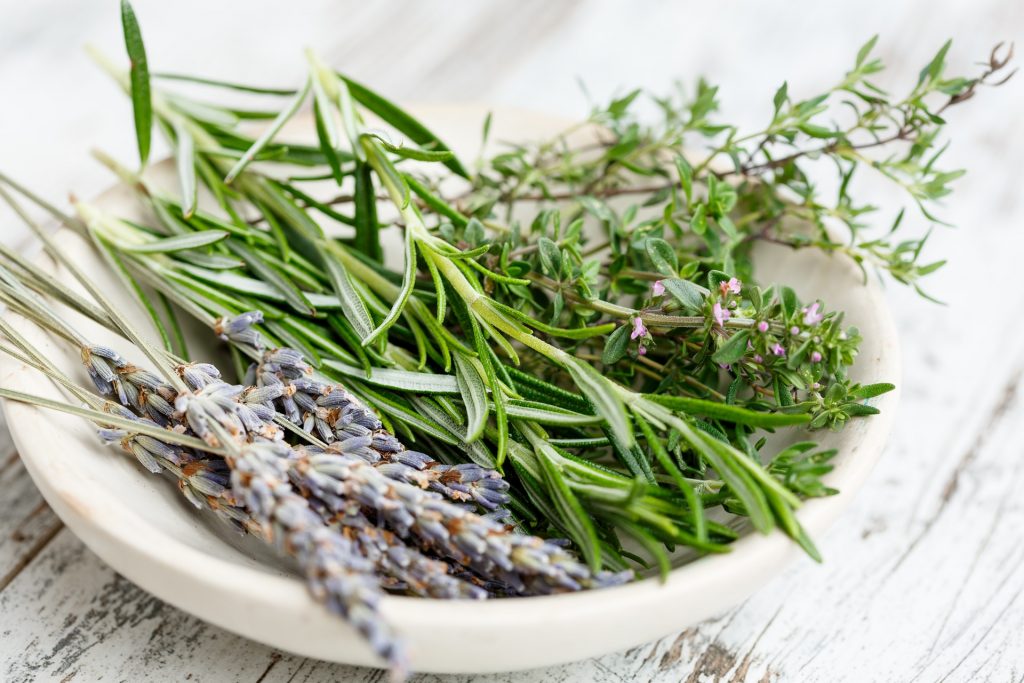 Rosmarinic acid is a phytochemical with important medicinal properties. Rosmarinic acid is an ester derivative of the hydroxycinnamic acid, caffeic acid. Rosmarinic acid is found in a large number of herbs and spices including rosemary (Rosmarinus officinalis), basil (Ocimum basilicum), lemon balm (Melissa officinalis), sage (Salvia officinalis), thyme (Thymus vulgaris), borage (Heliotropium foertherianum), Koren perilla (Perilla frutescens) and peppermint (Mentha piperita). Rosmarinic acid may explain the anxiolytic effects of some of these and other herbs. Rosmarinic acid is thought to exert its anxiolytic effects is through the GABA neurotransmitter system. In particular rosmarinic acid may increase levels of GABA in the brain, through inhibition of the metabolising enzyme 4-aminobutyrate transaminase. As GABA levels rise, a feeling of calmness ensues. Rosmarinic acid may also inhibit the indoleamine 2,3-dioxygenase enzyme, and in doing so may modulate the immune system and the inflammatory response.
Rosmarinic acid is a phytochemical with important medicinal properties. Rosmarinic acid is an ester derivative of the hydroxycinnamic acid, caffeic acid. Rosmarinic acid is found in a large number of herbs and spices including rosemary (Rosmarinus officinalis), basil (Ocimum basilicum), lemon balm (Melissa officinalis), sage (Salvia officinalis), thyme (Thymus vulgaris), borage (Heliotropium foertherianum), Koren perilla (Perilla frutescens) and peppermint (Mentha piperita). Rosmarinic acid may explain the anxiolytic effects of some of these and other herbs. Rosmarinic acid is thought to exert its anxiolytic effects is through the GABA neurotransmitter system. In particular rosmarinic acid may increase levels of GABA in the brain, through inhibition of the metabolising enzyme 4-aminobutyrate transaminase. As GABA levels rise, a feeling of calmness ensues. Rosmarinic acid may also inhibit the indoleamine 2,3-dioxygenase enzyme, and in doing so may modulate the immune system and the inflammatory response.
The mood elevating effects of rosmarinic acid have been investigated in a number of studies. For example, in one study, the neurochemical effects of rosmarinic acid were investigated in mice exposed to stressful conditions. Rosmarinic acid and its parent compound caffeic acid, both exerted significant antidepressant effects in the mice. The researchers noted that neither compound was able to alter the metabolism of monoamine neurotransmitters in mice brains, indicating that the antidepressant effect was via a different route. In another similar study, experimental stress was again induced in mice to cause behavioural changes. The behavioural changes were reversed, and there was a significant anti-stress effect exerted by both caffeic acid and rosmarinic acid. In another study, the anxiolytic effects of the herb Korean perilla (Perilla frutescens) were investigated using a number of different extracts,. However, only those herb extracts containing rosmarinic acid possessed the anxiolytic effects.

Rosmarinic acid has also been shown to be effective at ameliorating more severe forms of anxiety such as post-traumatic stress disorder. For example, in one study, rats were exposed to a stressful environment in order to experimentally induce post-traumatic stress disorder. The symptoms exhibited by the rats were however alleviated with coadministration of rosmarinic acid. Rats exposed to chronic stress have also been shown to have reductions in depression-like symptoms with coadministration of rosmarinic acid. In both of these studies, it was shown that rosmarinic acid improved extracellular-regulated kinase (ERK) signalling, something which often becomes inhibited in depression. The antidepressant drug venlafaxine is through to work primarily by increasing ERK expression. Rosmarinic acid may therefore share this mechanism of action.
Evidence from animal studies suggests that even at low doses, rosmarinic acid is effective at reducing anxiety. Incorporating a range of rosmarinic acid containing herbs into the diet should therefore be an effective strategy to elevate mood. Some evidence also suggests that rosmarinic acid have some cognitive enhancing effects. For example, in one study rosmarinic acid was shown to increase the cognition of rats undergoing an experimental learning test. The authors of the study also demonstrated that rosmarinic acid was able to inhibit the protease enzyme propyl oligopeptide. Propyl oligopeptide is able to cleave a number of proteins in the brain of mammals including arginine-vasopressin, substance P, oxytocin and angiotensin IV. These peptides are thought to be involved in memory formation, and by cleaving them propyl oligopeptide may inhibit memory formation. Rosmarinic acid may improve the formation of memories by inhibiting propyl oligopeptide and thus raise brain levels of the memory forming peptide.
RdB
Eat Well, Stay Healthy, Protect Yourself
